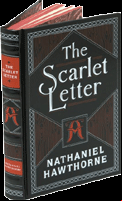6213v
| CAPTULO II continuacin - Pag 5 |
||||
| |
|
|||
| THE MARKET-PLACE A lane was forthwith opened through the crowd of spectators. Preceded by the beadle, and attended by an irregular procession of stern-browed men and unkindly visaged women, Hester Prynne set forth towards the place appointed for her punishment. A crowd of eager and curious schoolboys, understanding little of the matter in hand, except that it gave them a half-holiday, ran before her progress, turning their heads continually to stare into her face and at the winking baby in her arms, and at the ignominious letter on her breast. It was no great distance, in those days, from the prison door to the market-place. Measured by the prisoner's experience, however, it might be reckoned a journey of some length; for haughty as her demeanour was, she perchance underwent an agony from every footstep of those that thronged to see her, as if her heart had been flung into the street for them all to spurn and trample upon. In our nature, however, there is a provision, alike marvellous and merciful, that the sufferer should never know the intensity of what he endures by its present torture, but chiefly by the pang that rankles after it. With almost a serene deportment, therefore, Hester Prynne ed through this portion of her ordeal, and came to a sort of scaffold, at the western extremity of the market-place. It stood nearly beneath the eaves of Boston's earliest church, and appeared to be a fixture there. |
LA PLAZA DEL MERCADO 3q706cInmediatamente qued un espacio franco al travs de la turba de espectadores. Precedida del alguacil, y acompaada de una comitiva de hombres de duro semblante y de mujeres de rostro nada compasivo, Ester Prynne se adelant al sitio fijado para su castigo. Una multitud de chicos de escuela, atrados por la curiosidad y que no comprendan de lo que se trataba, excepto que les proporcionaba medio da de asueto, la preceda a todo correr, volviendo de cuando en cuando la cabeza ya para fijar las miradas en ella, ya en la tierna criaturita, ora en la letra ignominiosa que brillaba en el seno de la madre. En aquellos tiempos la distancia que haba de la puerta de la crcel a la plaza del mercado no era grande; sin embargo, midindola por lo que experimentaba Ester, debi de parecerle muy larga, porque a pesar de la altivez de su porte, cada paso que daba en medio de aquella muchedumbre hostil era para ella un dolor indecible. Se dira que su corazn haba sido arrojado a la calle para que la gente lo escarneciera y lo pisoteara. Pero hay en nuestra naturaleza algo, que participa de lo maravilloso y de lo compasivo, que nos impide conocer toda la intensidad de lo que padecemos, merced al efecto mismo de la tortura del momento, aunque ms tarde nos demos cuenta de ello por el dolor que tras s deja. Por lo tanto, con continente casi sereno sufri Ester esta parte de su castigo, y lleg a un pequeo tablado que se levantaba en la extremidad occidental de la plaza del mercado, cerca de la iglesia ms antigua de Boston, como si formara parte de la misma. Con respecto a Ester, sin embargo, como aconteca ms o menos frecuentemente, la sentencia ordenaba que estuviera de pie cierto tiempo en el tablado, sin introducir el cuello en la argolla o cepo que dejaba expuesta la cabeza a las miradas del pblico. Sabiendo bien lo que tena que hacer, subi los escalones de madera, y permaneci a la vista de la multitud que rodeaba el tablado o cadalso. |
|||
| |
|
|
La Mansin del Ingls. https://mansioningles.futbolgratis.org
Copyright La Mansin del Ingls C.B. - Todos los Derechos Reservados . -
Cmo puedo desactivar el bloqueo de anuncios en La Mansin del Ingls?




